- Home
- Thomas Harris
Cari Mora Page 7
Cari Mora Read online
Page 7
He got the good freezing sensation all over, raised the loppers and took the first long step and she shot him twice in the chest. Bobby Joe looked surprised until she shot him in the face.
His legs were still moving when she stepped over him. She heard shouts from the house as she stuffed the gun in the fanny pack and made a clean dive off the seawall, the grass and foam heaving like a lathered hide below her in her flight, the pouch banging against her as she hit the water, grass sticking in her hair as she plunged.
She saw movement through the green flotsam and swam hard, not coming up until she was under the dock next door, two hard breaths and under again. She saw movement long and dark through the murky water, below her and to the left. She swam as hard as she could, but the bag held her back. She was coming up for air and drew half a breath when she felt her ankle seized. She was pulled down under the water, grass in her face and hair, and she turned, wiping her face with her arm. Her other ankle was seized and she was pulled down.
She had to breathe and she fought her way up. Pulled down again. She cleared her eyes of grass; her chest was beginning to heave, she would suck in water soon. A patch of light between rafts of grass, and she could see it was Umberto in scuba gear, wide mask, bubbles coming up. He was going to drown her. Keep away from her and drown her, pulling her under by her ankles each time she tried to breathe. She got her hand inside the bag. He grabbed her ankles and she jackknifed, using his grip on her legs, and he was slow turning in his tanks.
She pressed the bag hard against him and shot him twice through the bag, the gases blowing up inside him like a bang-stick round. She pushed against him with her feet to rise. With fire in her chest she broke the surface, sucking in spray and air, coughing and gasping. She held to a dock ladder, scraping her hands on the barnacles, and she gasped and gasped.
It was another hundred yards to the place where the truck was parked.
She sat in the truck, trembling, her hand clutching the cloth of the passenger seat. It felt under her hand like a lace guayabera, where blood dries brown.
She gasped the air thick with jasmine. She did not cry.
Chapter Fifteen
Cari Mora had two meat-and-cheese baleadas in a plastic bag, a small bottle of water, and Antonio’s Sig Sauer P229 with seven rounds left in it plus a full extra clip. She had one hundred ten dollars in her wallet and the tools she used to touch up her nails on the bus. She had her short parasol, enhanced around the shaft with three lead washers off chlorine tanks. Antonio had attached the heavy washers to her parasol because she had to wait at bus stops a lot at night.
In a strip-mall parking lot Cari wiped down the inside of the truck. She could see herself in the mirrors as she wiped them. She could read nothing in her own face. She put on Antonio’s hoodie in case there were security cameras. The hoodie smelled like Antonio—Mountain Air antiperspirant and a touch of chlorine. There were some rubbers in the pocket of the hoodie. She took the religious medal hanging from the mirror and dropped it in the pocket with the condoms. She left the truck and caught a bus.
A genip tree grew near the stop where she had to change buses. Clearly the owner of the fruit tree did not know what it was or recognize the food on the ground, a common circumstance in Miami. Genips lay in the grass behind the bus stop and on the sidewalk. She could see mangoes too, rotting, wasted on the ground, but they were behind a fence, too far to reach. Cari gathered two handfuls of the little genips and put them in her purse. She peeled one to suck the pulpy flesh off the seed. It had the familiar sweet-tart taste and the texture of a lychee.
Once her own cell phone rang. Antonio’s telephone calling. She had seen him with his head cut off and still she had a strong urge to answer. The phone vibrated in her pocket. His phone was alive. It was not slack and still like the muscles in his back when she put her hand on him in the pool house.
She made sure her location services were off. She ate six more genips to keep her strength up. On the long bus ride to her cousin’s apartment she had time to think.
If the police did not come to the Escobar house, Hans-Peter Schneider would know she could not call the police. He would think she was part of the Ten Bells crew. Cari believed that Schneider would not bother to hunt her down until he had completed his business. Then, in his own good time, he would kill her or sell her to a place of no return.
Late in the evening she let herself in the back door of the apartment building near Claude Pepper Way. Cari’s aunt and her cousin Julieta and the baby were asleep.
She rubbed her hands with the juice of a lime and scrubbed them. She sat in the room with the baby, listening to her breathe. Cari picked her up and held her when she fretted in the night. Her weary cousin Julieta heard the baby and woke.
“I got it, stay there,” Cari said.
She warmed a bottle for the baby.
When the baby was wet, Cari cleaned her and powdered her and rocked her until she went back to sleep.
Late in the night she gave her own breast to her cousin’s baby when she was fretful. Even with no milk the baby rubbed her head against Cari and quieted down. Cari had never done that before. It dulled her flashes of Bobby Joe’s expression when she shot him in his face. Bobby Joe facedown with the back of his head blown out and the strap sticking out from the back of his cap and his legs still moving.
Rocking the infant, she looked at the stain on the ceiling shaped like Colombia. The poet was wrong, she thought. No, a baby is not just “another little house for death.” No es solamente otra casita para la muerte.
She closed her eyes. She should have insisted on going in the water with Antonio. She wished she had fucked his brains out when she wanted to. She wished she had pushed through that machista nonsense and told him she was going in the water with him. Instead she let him go into a tactical situation she understood better than he did. He was a damn Marine. He knew better.
Child soldier Cari, age twelve, got demerits for inattention at indoctrination classes—the classes made no more sense to her than Sunday school—but she caught on fast to tactics. FARC found her useful.
She thought the wounded were important and she was quick to learn emergency medicine. Her hand on a soldier’s face calmed the soldier while she tightened a tourniquet with the other hand.
She was good at the maintenance of weapons and equipment. Her main job, often a punishment for attitude, was cooking outdoors—twenty-gallon pots of the stew estofado de carne when they had the meat, cooking over an open fire at a place of scraped earth and camouflaged tin sheds where an Irishman was teaching them how to make mortars out of Kosan Gas cylinders, how to put a trip wire on a grenade, how to deal with a dud round in a mortar.
Kidnapping and extortion supported the guerrillas. One of Cari’s duties was taking care of an older professor FARC had kidnapped. He was a naturalist and a teacher and a sometime politician, a man in delicate health from a rich family in Bogotá. She took care of him for three years. The FARC keepers were reasonably good to the old man while they received payments from his family. They gave him books looted from the mansions of the oppressor, and Cari read to him when his eyes were tired, his glasses folded in his shirt pocket. The books they would let him have were nonpolitical, his captors thought. They were poetry and horticulture and nature. A FARC officer made the professor explain Darwin to the littlest trainees as an affirmation of communism.
The FARC camp was a curious combination of old and new. Following orders, Cari made field rat soup to combat whooping cough, and at the same time the commander had a laptop computer.
One of Cari’s duties was to recharge the computer’s batteries, lugging the heavy battery unit or pulling it in a child’s wagon to the nearest source of electricity. If the source was close and secure enough, the officers allowed the old naturalist to walk with her on her errand.
A warm spring day and Cari, twelve, was walking with the old kidnapped professor along a dirt road. Flowers were blooming on the ditch banks and bees were busy w
orking the blossoms. They were going to the nursing station to pick up the captive’s insulin, provided by his family with a big fee to FARC. They had to walk through a burned village, site of a recent massacre. It had been a village partial to the paramilitary. They were not looking into the huts because of what they might see. A buzzard flapped and scratched, making a lot of racket taking off from a tin roof. At one house, the occupants had tried to pull their stuff out into the yard. A mosquito net was tangled in the bushes. The old naturalist looked at it for a moment, and at the flowers along the road, and he pulled the net down and folded it.
“I think we could take this, don’t you?” he said to Cari. She carried it when he became fatigued.
In the afternoon, after Cari gave him his injection, the old man had to teach Darwin to a class of young recruits. The lecture covered principles of evolution that could be stretched to confirm communism as part of the natural order. A monitor sat in on the class to be sure the professor’s true opinion did not show through.
They were free then until Cari had to go cook the troop’s evening meal, a capybara for Lent. FARC had to allow a little religion, and capybaras do not count as meat during Lent since the Vatican ruled the rodent is a fish.
“I want to show you something,” the professor said. “Let’s cut this mosquito net in two. We have hats with a brim all round, get them please, and come with me.”
The old man took his time going through the woods behind his hut.
On the slope of a hill near a stream was a beehive. It filled half a hollow tree trunk. Cari and the professor put the nets over their hats and buttoned their sleeves. With strips of rag they tied their pants cuffs.
“If the bees get too stirred up we can come another time and smoke them,” the professor said. He had kept bees as a hobby before the kidnapping interrupted his life.
The bees were busy. Cari and her teacher stood close enough to the hive, but not too close.
“Their duties change with their age,” the professor said. “They are all female, the workers. They start by cleaning out the cell where they hatched. Then they clean and maintain the hive, then they receive nectar and pollen from the bees who go to the flowers, and last they go out to forage until they wear out. Some of these forager bees are new to it. It’s a strange new job to them—see, some of them are just circling the entrance, memorizing it so they can find it again. See the little stage at the entrance where the loaded bees arrive back at the hive from foraging? There are the foraging bees coming back from the fields. See the receiving committee stroking them? If a new forager comes back with even a little bit of pollen or a little bit of nectar they praise her extravagantly. Why?”
“So she will want to do it again,” Cari said.
“Yes,” he said. “So she will work herself to death hauling supplies to the hive. She is being cozened.” He looked at Cari for a long moment with his clear eyes. “She is being used. She will go out and go out and go out until she falls and dies somewhere under a flower, her wings worn down to little black stubs. The hive will take no notice of her absence. They do not grieve in the hive. When enough foragers die, they will make some more foragers. There is no such thing as a personal life. It is a machine.” He watched her, maybe wondering if she would report him. “So is this encampment, Cari, this system. It is a machine. You have a good and inventive mind, Cari. Don’t let them cozen you. Don’t limit your personal life to just the minutes you can steal in the woods with someone. Use your wings for yourself.”
Cari recognized this sort of talk as the most forbidden kind of subversion. Her duty was to report him to the comandante. She would be rewarded—maybe, instead of bathing with the men, the comandante would let her bathe early and alone when her period came, as his girlfriends did. She would be rewarded. She would be cozened. She thought about her friendly reception into the guerrilla group, the affection she was shown, the fellowship. The family feeling she wanted so much.
This was a family that let her drink at parties. It was a family tolerant of sex, if it was cleared with the comandante. It was also the family that told her to kill the ones who didn’t respond, or who ran away. They voted on whom to kill among the runaways. Everyone voted yes. Cari, when she was little, put up her hand with the others, voted yes with the others the first time, and never again. She was not sure what was happening. And then she saw it done, saw them shot where they stood in the water.
The word “cozen” stuck in her mind. In Spanish, “engañar.” When she became bilingual both words stuck in her mind.
Later in the day, after the bees, the comandante sent for Cari while she was cooking the capybara. His office was in a small house commandeered by FARC. Three women worked in his office. Their office duties were not readily apparent. All sat on cushions they had made.
Cari came to attention in front of his desk. She was not armed so she removed her hat.
“How is the professor?” the comandante said. The comandante was about thirty-five, a determined administrator, hesitant in combat. A Marxist theorist. He wore the same round steel-framed glasses he had worn as a student.
“Better, Comandante,” Cari said. “He has gained a few pounds. Eating green plantains rather than ripe ones has helped with his blood sugar. I look at his test tapes. He breathes better in his sleep.”
“Good, we need to keep him healthy. We will wait two weeks more for the next ransom. I suggest he write to his family again. If they don’t pay, the letter after that will contain his ears. And, Cari, you will cut them off.” The comandante twirled a paper clip on the point of a pencil.
“Now, Cari, Jorge tells me he saw you with the professor in the woods. The old man was wearing a mask or camouflage. You had one on too. Jorge was afraid the professor had talked you into something. He considered bringing you to me at gunpoint. Cari, what were you doing?”
“Comandante, the professor appreciates the courtesy you have extended to him, and he appreciates getting his medicine. He—”
“And he expresses this gratitude wearing a mask in the woods?”
“He was showing me how we can harvest honey. He kept bees in his life before. Those were bee hats he made. It is a survival skill he thought you might allow him to teach, along with Darwin. He said it could be useful to the troop to get nourishment in this way. Honey will last a long time in storage with no refrigeration. He told me that in an emergency you can bind up a wound with honey because it is almost sterile. We already have the mosquito nets. We could smoke the bees with smudges that don’t make much smoke. Not enough for an air patrol to see.”
The comandante twirled his clip. His several secretaries looked at Cari with disfavor.
“That is interesting, Cari. You should have approached me before you let him put on anything other than his approved clothing.”
“Yes, Comandante.”
“I have punished you before for lack of seriousness. Now I am going to reward you. What would you like? Would you like to go for the day to the feria?”
“I would like to bathe alone when my period comes, away from the men.”
“That is not our policy. That is sexism. We are all equal in this fight.”
“I thought maybe I could bathe early as these fighters here in your office do,” Cari said.
Years later on the long road north she would see cozening at the bus stations when the wolves cruised by offering food and feigned affection in exchange for whatever sex the kid could manage or could be shown how to do. Often the wolf had the food and candy in the car and the occasional teddy bear. They did not have to give the child the teddy bear, just let them hold it until the wolf snatched it back and pushed the child out of the car at the bus station. Sometimes the children could keep some new flip-flops with sequins and flowers on them.
Finally the old naturalist’s relatives made the balloon payment and he was released. His FARC keepers let him shave and put on the dress shirt in which he had been taken, now threadbare, and his suspenders. Cari looked the old man in
the face and asked him if he could take her with him, and he asked his captors. They said no. He asked if he could send money for her release. They said maybe. The money never came. Or maybe it did. Cari was not released.
She escaped when she was fifteen. She escaped with a boy a year older. He had reddish hair and was missing a corner from one of his front teeth. They slept together in the woods whenever they could and he was dear to her. After the first time, sleeping together on a balsam bed on the forest floor, he looked at her like she was holy.
Shortly after dawn on her last day as a soldier, Cari’s unit was ordered to attack a village that supported the ultra-right paramilitary enemy. It was during the time of the sides alternately massacring entire villages, though some newscasters called it only “decimating,” not understanding the term.
Often villages were taken over by force, by one side or the other. Then the other side destroyed the village and its residents for harboring the enemy. This raid by FARC was to avenge a massacre by the ultra-right paramilitary three weeks before at a village sympathetic to the guerrillas. The paramilitary had killed everyone in the village: guerrillas, residents, their children, their animals and all.
In this way Cari’s family was massacred by the paramilitaries in her second year as a soldier. She did not find out for six months, and when she heard she could not speak aloud for two weeks.
FARC’s mission was to do the same thing to the other side, kill the paramilitary troops and kill everyone else in the village that sheltered them, with no exceptions, and burn the dwellings. They took some gunfire from the woods going in. Cari fell behind, stopping to bind a poncho over a guerrilla’s sucking chest wound, holding it to keep the young trooper’s lung inflated until the medic came. She was shot at twice from the forest and she lay flat beside the wounded man, and fired back across his body. She moved off the red dirt road, moving through the trees parallel to the road.

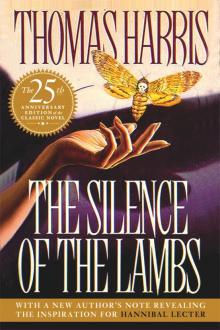 The Silence of the Lambs
The Silence of the Lambs Red Dragon
Red Dragon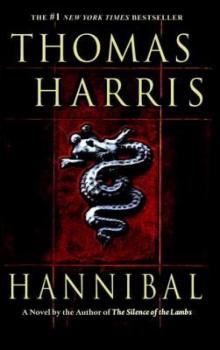 Hannibal
Hannibal Black Sunday
Black Sunday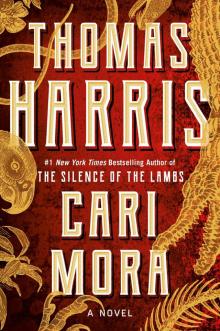 Cari Mora
Cari Mora Hannibal Rising
Hannibal Rising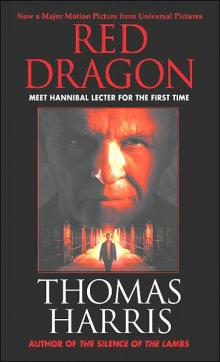 Red Dragon hl-1
Red Dragon hl-1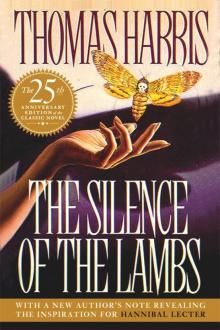 The Silence of the Lambs (Hannibal Lecter)
The Silence of the Lambs (Hannibal Lecter)